12 Proven Benefits of Creatine: Beyond Muscle Growth (Updated Guide)
Why the world's most researched supplement is essential for your brain, longevity, and energy, not just your biceps.
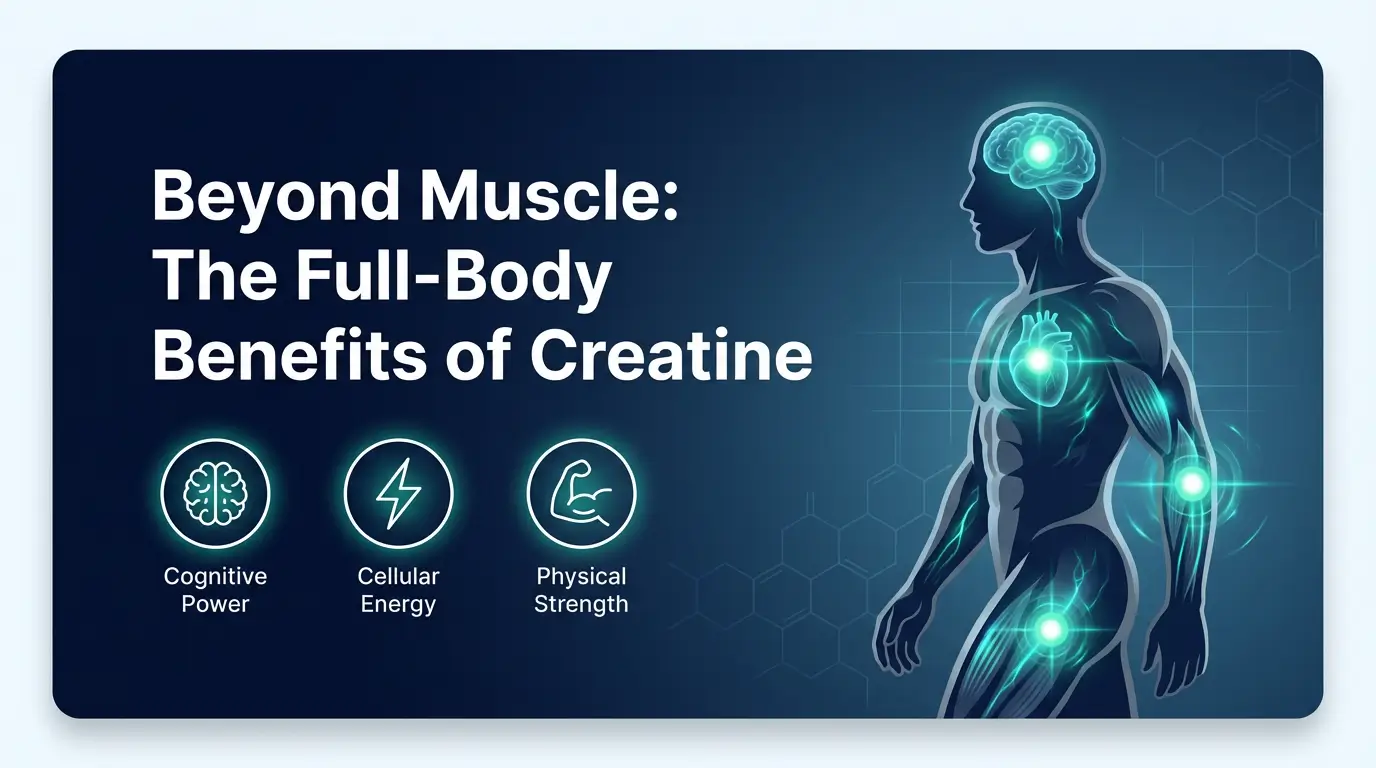
Creatine is the single most studied supplement in sports nutrition history. More than 500 peer-reviewed studies confirm its safety and effectiveness [1]. Yet most people still think of it as a powder for gym bros chasing bicep veins.
This perception misses the point entirely.
Creatine is not a steroid. It is not a shortcut. It is a fuel source your body already produces and uses every single day.
Your liver, kidneys, and pancreas synthesize about 1 gram daily [2]. You get another gram from meat and fish.
The benefits of creatine extend far beyond muscle tissue, reaching your brain, your bones, and your cellular energy systems.
The real story? Creatine powers everything from your final squat rep to your ability to focus during a 3 PM meeting. It supports brain health during aging, helps vegetarians close a nutritional gap, and gives seniors the strength to stay independent longer.
Whether you are a competitive athlete, a busy mother managing mental fatigue, or a retiree focused on longevity, creatine has specific utility for you. This guide breaks down exactly how it works, who benefits most, and how to use it correctly.
How Creatine Actually Works
Your cells run on adenosine triphosphate, or ATP. Think of ATP as the cash your body spends to do work. Every muscle contraction, every thought, every heartbeat costs ATP.
The problem? You only carry enough ATP for about 8 to 10 seconds of maximum effort [3]. Sprint all-out for 10 seconds and your ATP reserves hit empty. Your body needs to regenerate that ATP instantly, or you slow down.
This is where creatine enters the picture.
Creatine as Your Cellular Recharge System
Creatine stores high-energy phosphate groups in your muscles as phosphocreatine. When ATP depletes, phosphocreatine donates its phosphate group to regenerate ATP almost immediately [4].
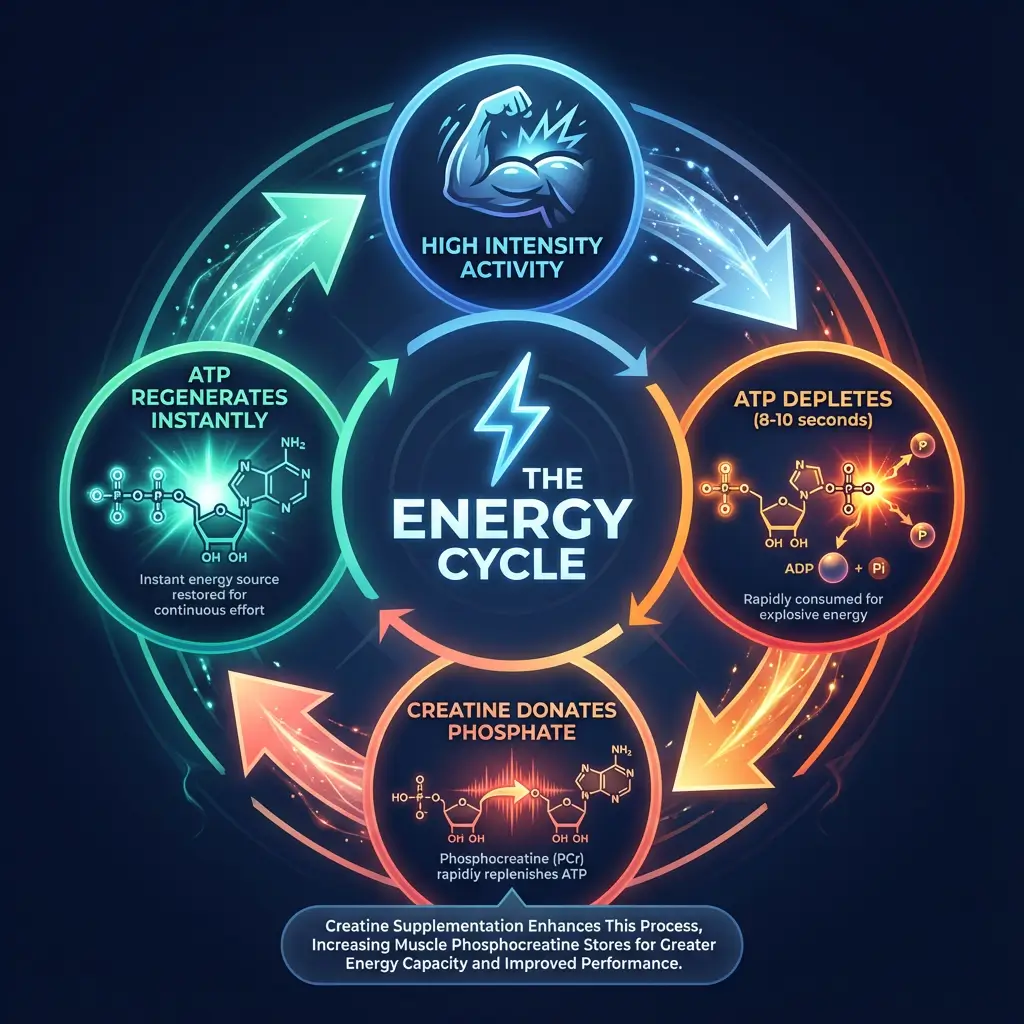
This process, called the phosphocreatine system, buys you an additional 10 to 15 seconds of high-intensity output.
“Why does this matter if I’m not a sprinter?”
Because ATP regeneration affects everything.
- Lifting heavier weights.
- Recovering between sets.
- Thinking clearly under stress.
Your brain consumes about 20% of your body’s ATP despite being only 2% of your body weight [5]. More efficient ATP regeneration means better physical AND cognitive performance.
Supplementing with creatine monohydrate increases your phosphocreatine stores by 10 to 40%, depending on your baseline levels [6]. This gives your muscles and brain a larger energy reserve to draw from during demanding tasks.
Universal Creatine Benefits
1. Explosive Strength and Power Output
Creatine’s primary claim to fame is its effect on high-intensity performance. A meta-analysis of 22 studies found that creatine supplementation increases strength by an average of 8% and power output by 14% compared to placebo [7].
These gains show up in real-world activities. Sprinting. Jumping. HIIT workouts. Any activity requiring repeated bursts of maximum effort benefits from larger phosphocreatine reserves.
For you, this means finishing that last set of squats with better form. It means faster recovery between sprints. It means maintaining power output in the fourth quarter when your competition fades.
2. Accelerated Muscle Growth (Hypertrophy)
Creatine increases muscle size through two primary mechanisms.
- First, cell volumization. Creatine pulls water into muscle cells, increasing intracellular hydration by approximately 2 to 3 pounds of water weight in the first week [8].
This is not the puffy bloating people fear. This is water INSIDE muscle tissue, which triggers anabolic signaling pathways. Hydrated cells signal to your body that conditions are favorable for growth.
- Second, satellite cell activation. Your muscles repair micro-tears from training using satellite cells. Research shows creatine supplementation increases satellite cell number by 100% and myonuclei concentration by 35% over 16 weeks of resistance training [9]. More satellite cells means faster repair and greater growth potential.
(Ed. note: This is why creatine works synergistically with strength training. Taking creatine without training still provides cognitive benefits, but muscle-building effects require the stimulus of resistance exercise.)
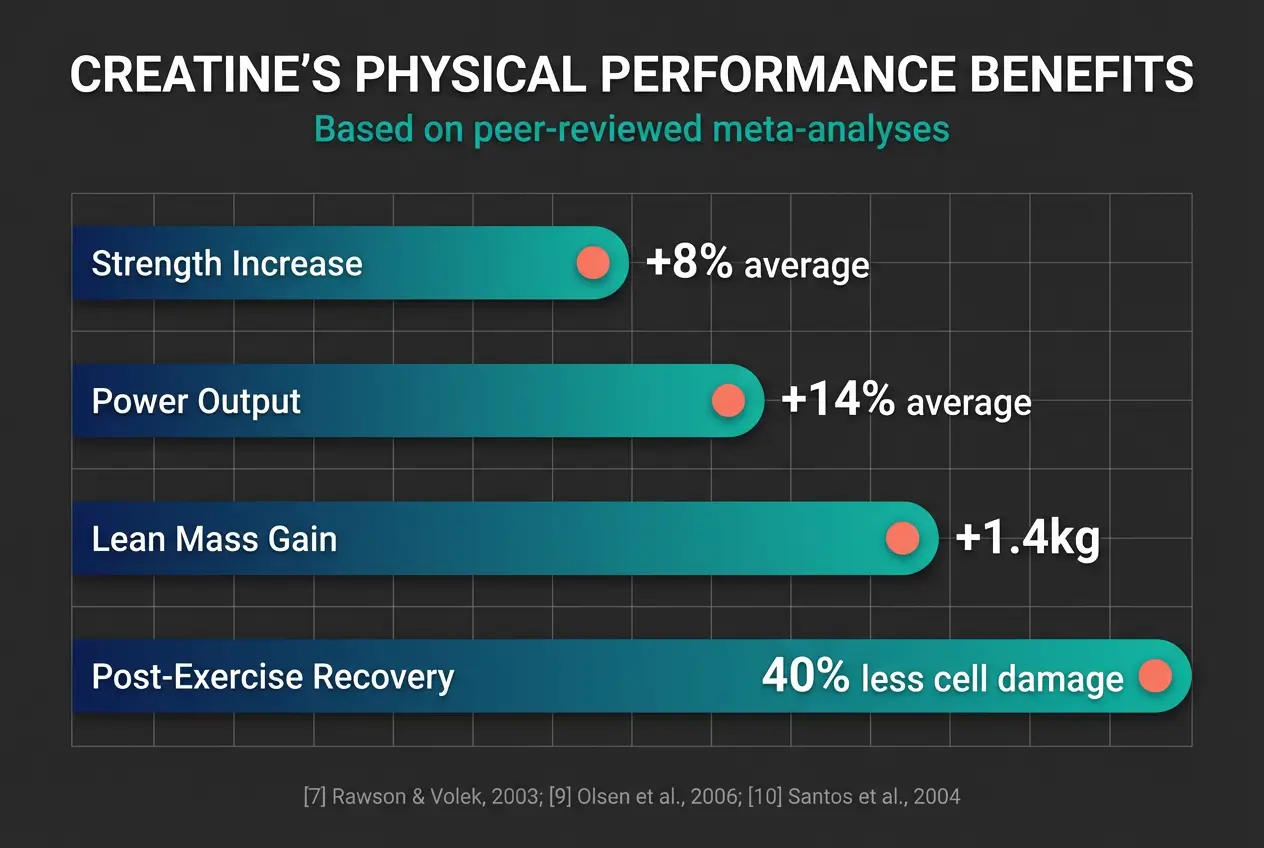
3. Enhanced Recovery and Injury Prevention
Hard training creates cellular damage. This damage, measured through markers like creatine kinase and lactate dehydrogenase, indicates muscle breakdown that requires recovery.
A study on endurance athletes found that creatine supplementation reduced post-exercise cell damage markers by 40% compared to placebo [10]. Less damage means faster recovery between sessions and reduced injury risk over time.
Creatine also accelerates recovery from immobilization. Research on patients recovering from leg casting showed that creatine supplementation preserved muscle mass and accelerated strength recovery compared to controls [11].
If you are rehabbing from surgery or injury, creatine supports your return to full function.
4. Cognitive Function and Mental Focus
Your brain is an energy-hungry organ. It runs on ATP constantly, and demanding cognitive tasks deplete brain ATP rapidly.
Creatine crosses the blood-brain barrier and increases brain phosphocreatine stores [12]. This translates to measurable cognitive benefits.
A randomized controlled trial found that creatine supplementation improved working memory and intelligence testing performance, particularly during mentally demanding tasks [13].
The benefits are most pronounced under stress. A study on sleep-deprived subjects found that 5g of creatine daily for 7 days reduced the negative cognitive effects of sleep deprivation by 50% compared to placebo [14]. Your 3 PM brain fog after a poor night’s sleep responds to the same mechanism that powers your bench press.
Students, professionals, and anyone facing cognitive demands can benefit from creatine’s effects on mental energy.
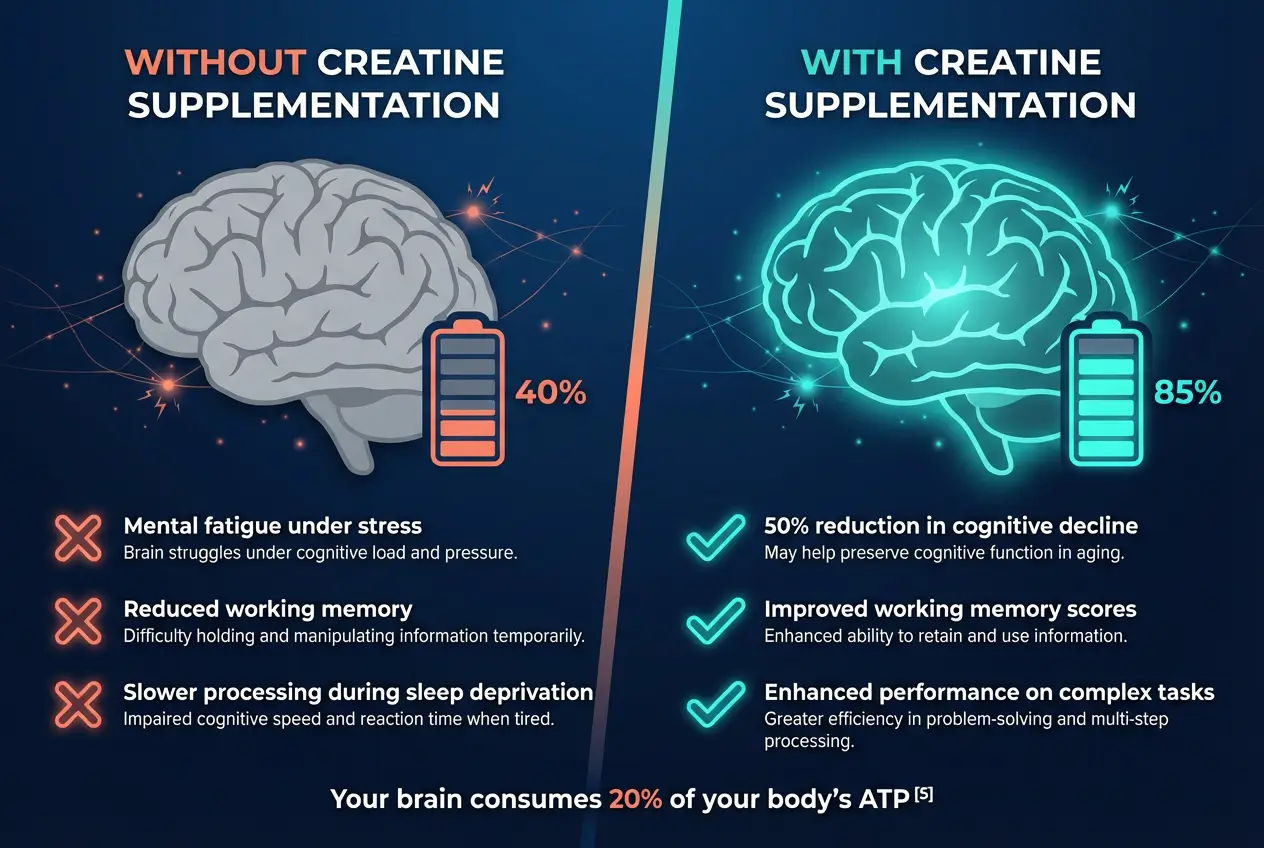
5. Neuroprotection and Brain Health
Beyond acute cognitive enhancement, creatine shows promise for long-term brain health.
Research on traumatic brain injury suggests creatine may have neuroprotective effects. A pilot study in children with TBI found that creatine supplementation was associated with improved cognitive outcomes and reduced post-traumatic symptoms [15]. Contact sport athletes are increasingly using creatine as a preventive measure.
Emerging research also links creatine to neurodegenerative disease. Early studies in Huntington’s disease and Parkinson’s disease patients show that creatine may slow disease progression, though larger trials are ongoing [16].
The mechanism appears related to creatine’s ability to maintain cellular energy status under metabolic stress.
Your brain benefits from creatine whether you are 25 or 75.
Benefits of Creatine for Men
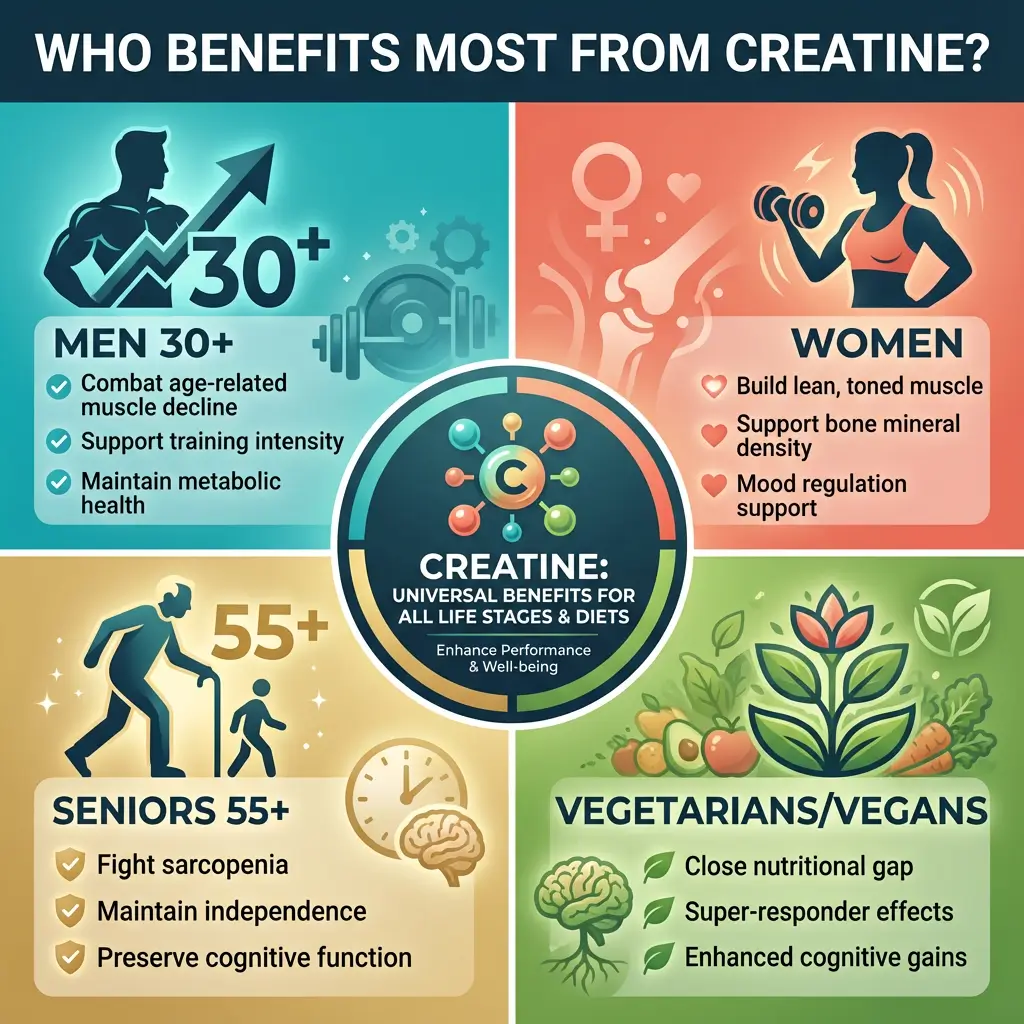
6. Combats Muscle Loss
Men over 30 face a gradual decline in muscle mass of approximately 3 to 5% per decade [17]. This decline accelerates after 50 and contributes to metabolic dysfunction, reduced mobility, and increased injury risk.
Creatine directly combats this decline by enhancing training capacity and supporting muscle protein synthesis. For men in their 30s, 40s, and beyond, creatine is not about getting huge. It is about maintaining the muscle mass that supports metabolic health and physical function.
“Will creatine make me go bald?”
This concern comes from a single 2009 study in rugby players that found creatine increased dihydrotestosterone (DHT) levels by 56% [18]. DHT is linked to male pattern baldness in genetically susceptible individuals.
However, this study has never been replicated. A 2021 systematic review of 12 studies found no consistent effect of creatine on testosterone or DHT levels [19].
The rugby study used a very high loading dose (25g/day) and measured DHT at a single timepoint. The current scientific consensus is that typical creatine supplementation does not meaningfully affect hair loss risk.
If you are genetically predisposed to baldness, you will likely lose hair regardless of creatine. If you are not, creatine will not trigger hair loss.
Benefits of Creatine for Women
7. Leaner Bodies
Many women avoid creatine because they fear “getting bulky.” This fear is based on a misunderstanding of physiology.
Women produce approximately 15 to 20 times less testosterone than men [20]. Testosterone is the primary hormone driving significant muscle hypertrophy. Women taking creatine will not suddenly develop bodybuilder physiques.
Instead, creatine helps women achieve the lean, toned appearance many desire by hydrating muscle tissue and supporting the high-intensity training that builds muscle definition.
8. Hormonal and Mood Benefits
Research suggests creatine may support mood regulation in women, particularly during the luteal phase of the menstrual cycle. A study found that creatine supplementation improved depressive symptoms in women with major depressive disorder when added to standard treatment [21].
The mechanism likely relates to creatine’s effects on brain energy metabolism.
9. Bone Mineral Density
Post-menopausal women face accelerated bone loss due to declining estrogen levels. A study combining creatine supplementation with resistance training in post-menopausal women found greater preservation of bone mineral density compared to training alone [22].
For women concerned about osteoporosis, creatine plus strength training offers a powerful preventive combination.
Benefits of Creatine for Seniors
10. Fights Sarcopenia
Sarcopenia, the age-related loss of muscle mass and strength, is one of the strongest predictors of mortality and disability in older adults [23]. Falls, fractures, and loss of independence all correlate with reduced muscle function.
Creatine supplementation in older adults produces consistent benefits. A meta-analysis of studies in adults over 57 found that creatine combined with resistance training increased lean mass by 1.4kg and improved upper and lower body strength more than training alone [24].
These strength gains translate to daily life. Getting out of a chair without using your arms. Carrying groceries up stairs. Maintaining grip strength to open jars. These mundane activities become challenging with sarcopenia and remain accessible with preserved muscle function.
11. Cognitive Preservation
Older adults also experience the cognitive benefits of creatine. A study in healthy elderly subjects found that 4 weeks of creatine supplementation improved memory and reduced mental fatigue during cognitive testing [25].
Maintaining brain energy reserves supports processing speed and recall as you age.
For seniors focused on longevity and independence, creatine belongs in your supplement stack.
The Vegetarian and Vegan Advantage
12. Closes a nutritional gap
People following plant-based diets consume zero dietary creatine. Meat and fish are the only food sources. As a result, vegetarians and vegans have 20 to 30% lower muscle creatine stores compared to omnivores [26].
This means plant-based eaters often respond more dramatically to supplementation. They are “super-responders” who see larger improvements in both physical and cognitive measures when they begin taking creatine.
A study comparing creatine supplementation effects in vegetarians versus omnivores found that vegetarians showed greater improvements in memory and intelligence measures [27]. The cognitive benefits of creatine are amplified when you start from a lower baseline.
If you eat a plant-based diet, creatine supplementation is not optional. It closes a nutritional gap that your diet cannot fill.
Myth-Busting (Fact vs. Fiction)
| Myth | Fact |
|---|---|
| “Creatine destroys your kidneys.” | Dozens of long-term studies, including one spanning 5 years, found no adverse effects on kidney function in healthy individuals [28]. If you have pre-existing kidney disease, consult your doctor first. |
| “Creatine causes bloating and water retention.” | The water retention occurs INSIDE muscle cells, not subcutaneously. Bloating typically results from poor quality creatine, insufficient water intake, or excessive dosing. |
| “You have to cycle creatine on and off.” | No evidence supports cycling. Your body does not build tolerance to creatine. Consistent daily supplementation maintains saturated stores and provides continuous benefits. |
| “Loading phases are required.” | Loading (20g/day for 5 to 7 days) saturates stores faster but is optional. Taking 3 to 5g daily achieves the same saturation within 3 to 4 weeks without the digestive discomfort. |
| “Creatine is a steroid.” | Creatine is a naturally occurring amino acid compound. It shares nothing in common with anabolic steroids chemically, legally, or physiologically. |
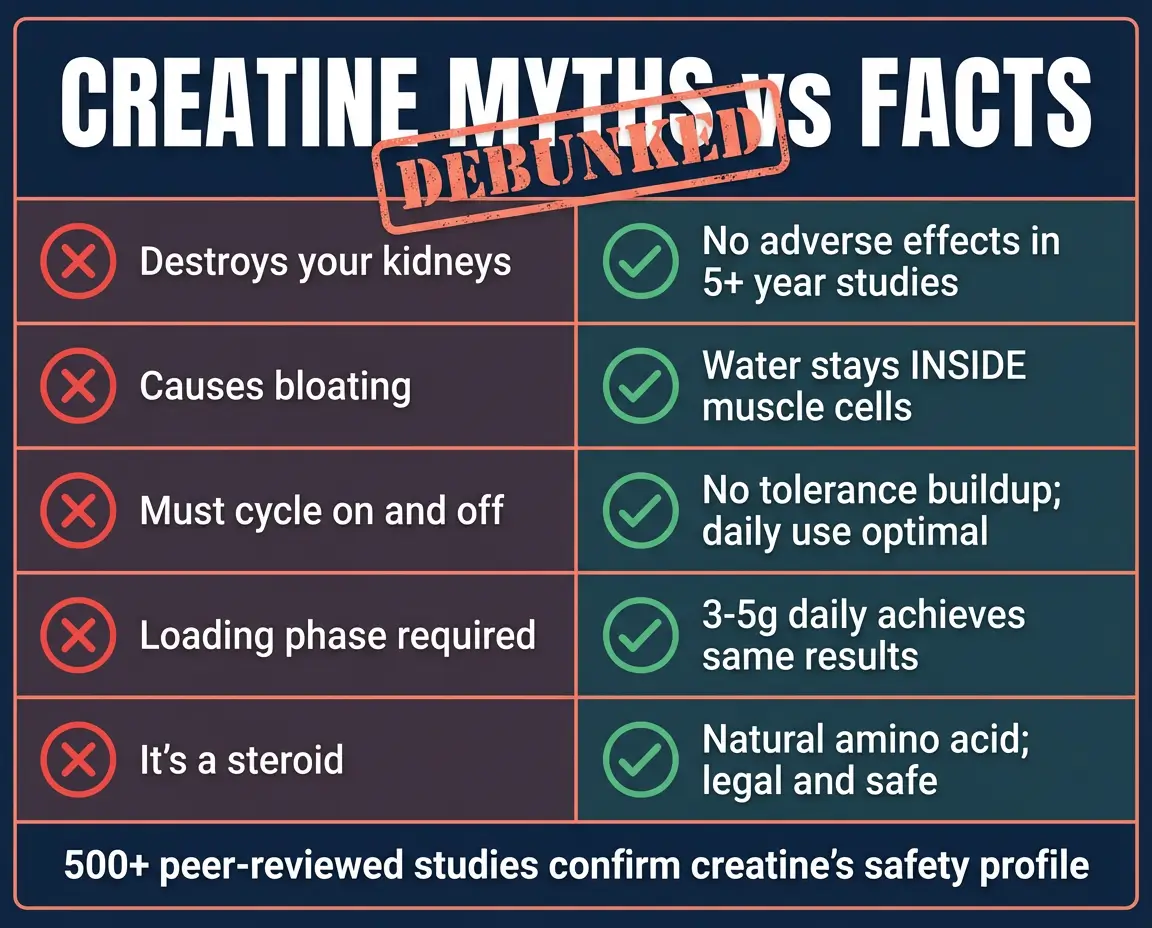
Recommended Creatine Supplements
Criteria for Selection
- Purity: Choose creatine monohydrate. It is the most researched form with the strongest evidence base. Other forms (creatine HCL, buffered creatine, creatine ethyl ester) offer no proven advantages despite higher prices.
Creapure is the gold standard for purity. This German-manufactured creatine monohydrate is tested for contaminants like creatinine, dicyandiamide, and dihydrotriazine. Look for the Creapure logo on the label.
- Testing: Third-party lab testing for heavy metals and purity should be verified. Reputable brands publish certificates of analysis.
- Form: Micronized powder dissolves better than standard powder and costs less than capsules per serving. Capsules are convenient but more expensive and require swallowing 5 to 10 pills to match one scoop of powder.
Top Recommendations
For Maximum Purity (The Biohacker Choice): Nootropics Depot Creatine Monohydrate
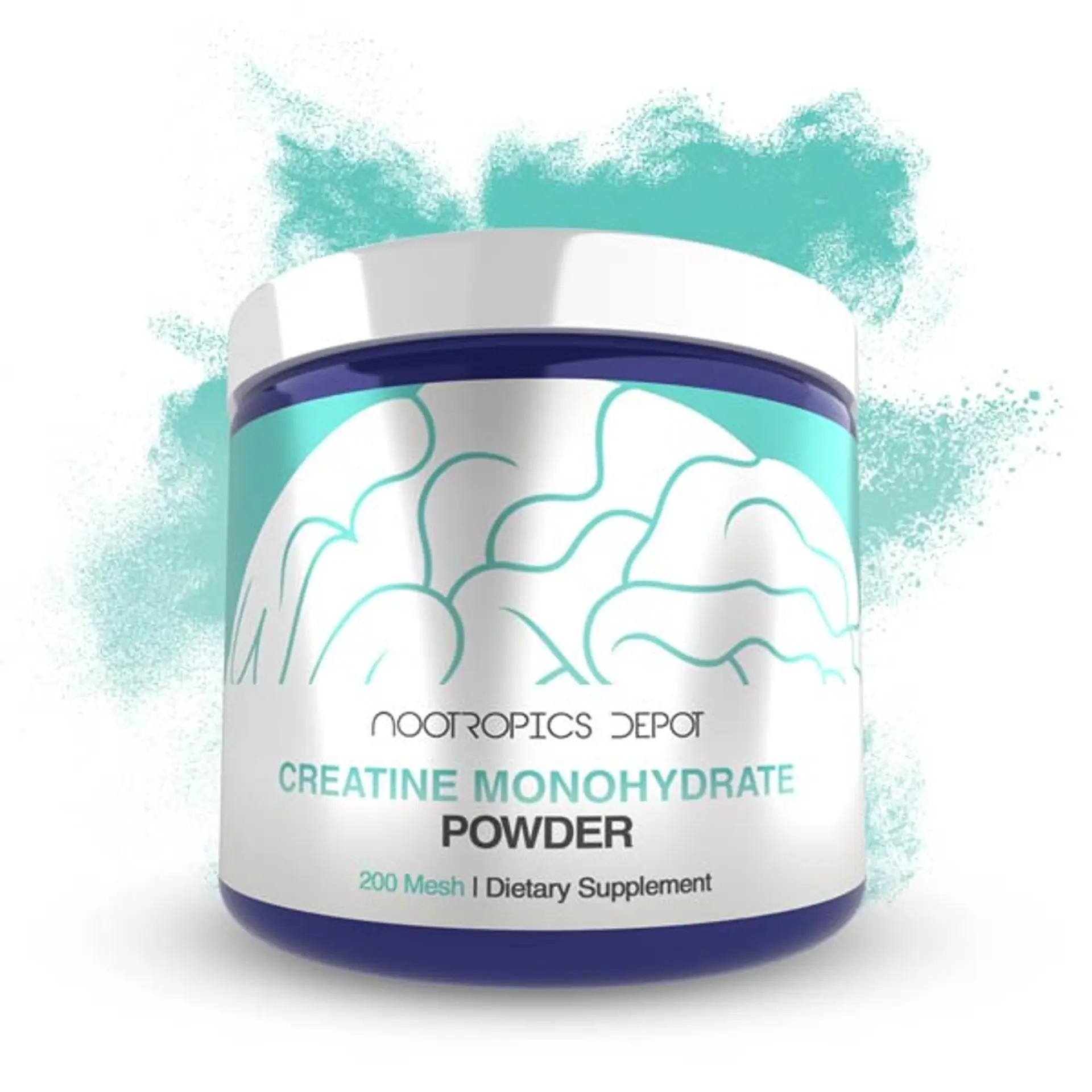
Nootropics Depot publishes batch-specific lab testing results on their website. They test for identity, purity, heavy metals, and microbial contamination. If you want complete transparency about what you are consuming, this is your source.
For International Shoppers (Value and Reliability): California Gold Nutrition Creatine Monohydrate
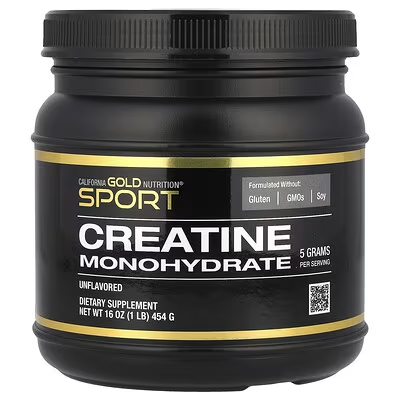
This product uses Creapure source material at an excellent price point. iHerb ships internationally with competitive rates and consistent delivery times. Thorne Creatine is an alternative for drug-tested athletes since it carries NSF Certified for Sport certification.
For Convenience (Fast Shipping and Availability): Optimum Nutrition Micronized Creatine Powder

Optimum Nutrition has manufactured creatine for decades with consistent quality. Thousands of verified reviews confirm reliability.
The Quick-Start Protocol
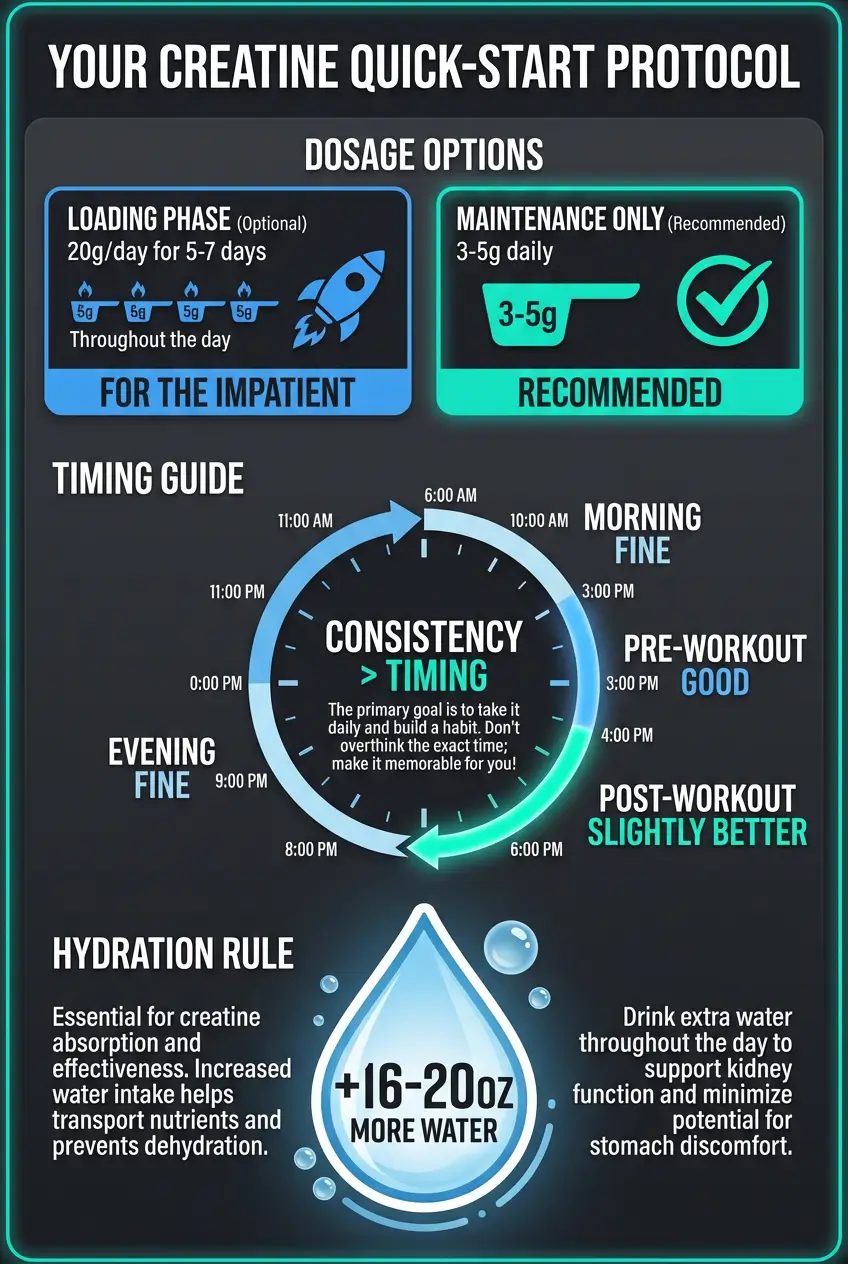
Dosage
- Option 1: Loading Phase Take 20g daily (divided into 4 doses of 5g) for 5 to 7 days. This saturates muscle stores within one week. Downsides include potential digestive discomfort, water weight gain, and the inconvenience of multiple daily doses.
- Option 2: Maintenance Only (Recommended) Take 3 to 5g daily without loading. Muscle saturation occurs within 3 to 4 weeks. This approach causes fewer side effects and is easier to maintain long-term. Choose 5g if you weigh over 200 pounds; 3g is sufficient for lighter individuals.
Timing
“Does it matter when I take creatine?”
Research shows a slight advantage for post-workout consumption due to increased blood flow and nutrient uptake [29]. However, the difference is minimal. The best time to take creatine is whenever you will remember to take it consistently.
Daily compliance matters far more than timing optimization.
Hydration Rule
Creatine pulls water into muscle cells. You must increase your water intake by 16 to 20oz daily to prevent cramping and support the cell volumization process. If you experience muscle cramps on creatine, dehydration is the likely cause.
Mixing
Creatine monohydrate dissolves best in warm water or mixed with a post-workout shake. It has no flavor and mixes into any beverage. Taking creatine with carbohydrates may slightly improve uptake, but this is not required.
The Foundation of Modern Supplementation
Creatine monohydrate costs roughly $0.10 to $0.20 per day. It has over 500 peer-reviewed studies confirming safety and effectiveness. It benefits your muscles, your brain, your recovery, and your longevity.
The benefits of creatine extend to virtually everyone.
- Athletes.
- Weekend warriors.
- Busy professionals fighting brain fog.
- Women seeking lean muscle and bone protection.
- Seniors maintaining independence.
- Vegetarians closing nutritional gaps.
Stop viewing creatine as a bodybuilding supplement. Start viewing it as cellular energy optimization that happens to also build muscle.
Your next step is simple. Purchase a quality creatine monohydrate from a reputable source. Take 3 to 5g daily with plenty of water. Train hard. Think clearly. Age better.
Which benefit surprised you most? Let us know in the comments below.
Frequently Asked Questions
References
- [1] Kreider, R.B. et al. “International Society of Sports Nutrition position stand: safety and efficacy of creatine supplementation in exercise, sport, and medicine.” Journal of the International Society of Sports Nutrition, 2017. https://doi.org/10.1186/s12970-017-0173-z
- [2] Brosnan, J.T. & Brosnan, M.E. “Creatine: endogenous metabolite, dietary, and therapeutic supplement.” Annual Review of Nutrition, 2007. https://doi.org/10.1146/annurev.nutr.27.061406.093621
- [3] Sahlin, K. “Muscle energetics during explosive activities and potential effects of nutrition and training.” Sports Medicine, 2014. https://doi.org/10.1007/s40279-014-0256-9
- [4] Wallimann, T. et al. “Intracellular compartmentation, structure and function of creatine kinase isoenzymes in tissues with high and fluctuating energy demands.” Biochemical Journal, 1992. https://doi.org/10.1042/bj2810021
- [5] Raichle, M.E. & Gusnard, D.A. “Appraising the brain’s energy budget.” Proceedings of the National Academy of Sciences, 2002. https://doi.org/10.1073/pnas.172399499
- [6] Harris, R.C. et al. “Elevation of creatine in resting and exercised muscle of normal subjects by creatine supplementation.” Clinical Science, 1992. https://doi.org/10.1042/cs0830367
- [7] Rawson, E.S. & Volek, J.S. “Effects of creatine supplementation and resistance training on muscle strength and weightlifting performance.” Journal of Strength and Conditioning Research, 2003.
- [8] Ziegenfuss, T.N. et al. “Effect of creatine loading on anaerobic performance and skeletal muscle volume in NCAA Division I athletes.” Nutrition, 2002. https://doi.org/10.1016/s0899-9007(01)00802-4
- [9] Olsen, S. et al. “Creatine supplementation augments the increase in satellite cell and myonuclei number in human skeletal muscle induced by strength training.” Journal of Physiology, 2006. https://doi.org/10.1113/jphysiol.2006.107359
- [10] Santos, R.V. et al. “The effect of creatine supplementation upon inflammatory and muscle soreness markers after a 30km race.” Life Sciences, 2004. https://doi.org/10.1016/j.lfs.2003.11.036
- [11] Hespel, P. et al. “Oral creatine supplementation facilitates the rehabilitation of disuse atrophy and alters the expression of muscle myogenic factors in humans.” Journal of Physiology, 2001. https://doi.org/10.1111/j.1469-7793.2001.0625a.x
- [12] Dechent, P. et al. “Increase of total creatine in human brain after oral supplementation of creatine-monohydrate.” American Journal of Physiology, 1999. https://doi.org/10.1152/ajpregu.1999.277.3.R698
- [13] Rae, C. et al. “Oral creatine monohydrate supplementation improves brain performance: a double-blind, placebo-controlled, cross-over trial.” Proceedings of the Royal Society B, 2003. https://doi.org/10.1098/rspb.2003.2492
- [14] McMorris, T. et al. “Effect of creatine supplementation and sleep deprivation, with mild exercise, on cognitive and psychomotor performance, mood state, and plasma concentrations of catecholamines and cortisol.” Psychopharmacology, 2006. https://doi.org/10.1007/s00213-005-0269-z
- [15] Sakellaris, G. et al. “Prevention of traumatic headache, dizziness and fatigue with creatine administration.” Acta Paediatrica, 2008. https://doi.org/10.1111/j.1651-2227.2007.00529.x
- [16] Bender, A. et al. “Creatine supplementation in Parkinson disease: a placebo-controlled randomized pilot trial.” Neurology, 2006. https://doi.org/10.1212/01.wnl.0000238518.34389.12
- [17] Volpi, E. et al. “Muscle tissue changes with aging.” Current Opinion in Clinical Nutrition and Metabolic Care, 2004. https://doi.org/10.1097/01.mco.0000134362.76653.b2
- [18] van der Merwe, J. et al. “Three weeks of creatine monohydrate supplementation affects dihydrotestosterone to testosterone ratio in college-aged rugby players.” Clinical Journal of Sport Medicine, 2009. https://doi.org/10.1097/JSM.0b013e3181b8b52f
- [19] Antonio, J. et al. “Common questions and misconceptions about creatine supplementation: what does the scientific evidence really show?” Journal of the International Society of Sports Nutrition, 2021. https://doi.org/10.1186/s12970-021-00412-w
- [20] Handelsman, D.J. et al. “Circulating testosterone as the hormonal basis of sex differences in athletic performance.” Endocrine Reviews, 2018. https://doi.org/10.1210/er.2018-00020
- [21] Lyoo, I.K. et al. “A randomized, double-blind placebo-controlled trial of oral creatine monohydrate augmentation for enhanced response to a selective serotonin reuptake inhibitor in women with major depressive disorder.” American Journal of Psychiatry, 2012. https://doi.org/10.1176/appi.ajp.2012.12010009
- [22] Chilibeck, P.D. et al. “Effect of creatine supplementation during resistance training on lean tissue mass and muscular strength in older adults: a meta-analysis.” Open Access Journal of Sports Medicine, 2017. https://doi.org/10.2147/OAJSM.S123529
- [23] Cruz-Jentoft, A.J. et al. “Sarcopenia: revised European consensus on definition and diagnosis.” Age and Ageing, 2019. https://doi.org/10.1093/ageing/afy169
- [24] Devries, M.C. & Phillips, S.M. “Creatine supplementation during resistance training in older adults.” Medicine and Science in Sports and Exercise, 2014. https://doi.org/10.1249/MSS.0000000000000220
- [25] McMorris, T. et al. “Creatine supplementation and cognitive performance in elderly individuals.” Neuropsychology, Development, and Cognition, 2007. https://doi.org/10.1080/13825580600788100
- [26] Burke, D.G. et al. “Effect of creatine and weight training on muscle creatine and performance in vegetarians.” Medicine and Science in Sports and Exercise, 2003. https://doi.org/10.1249/01.MSS.0000093614.17517.79
- [27] Benton, D. & Donohoe, R. “The influence of creatine supplementation on the cognitive functioning of vegetarians and omnivores.” British Journal of Nutrition, 2011. https://doi.org/10.1017/S0007114510004733
- [28] Poortmans, J.R. et al. “Long-term oral creatine supplementation does not impair renal function in healthy athletes.” Medicine and Science in Sports and Exercise, 1999.
- [29] Antonio, J. & Ciccone, V. “The effects of pre versus post workout supplementation of creatine monohydrate on body composition and strength.” Journal of the International Society of Sports Nutrition, 2013. https://doi.org/10.1186/1550-278
